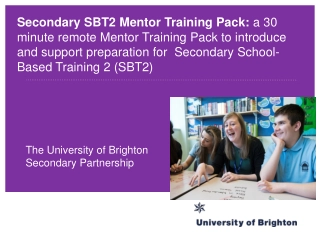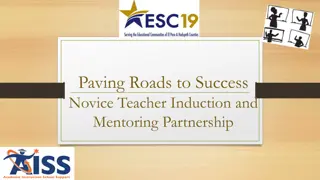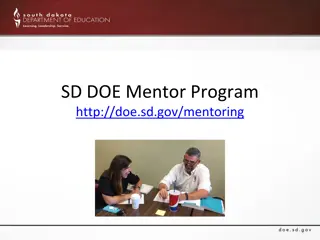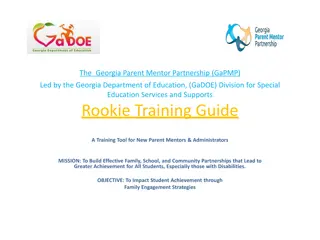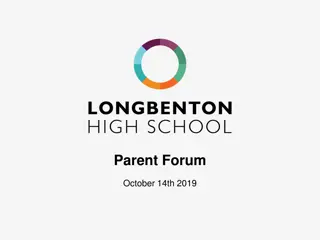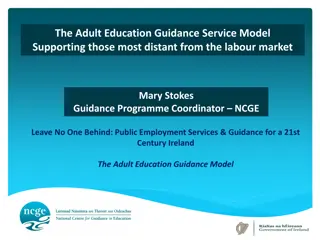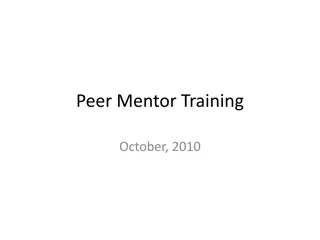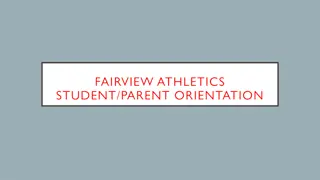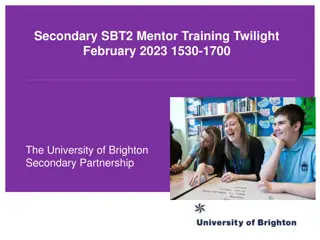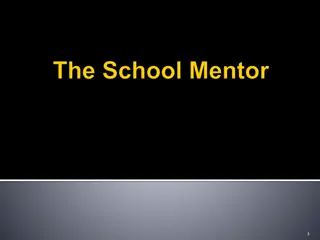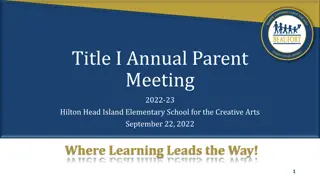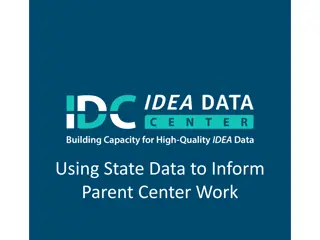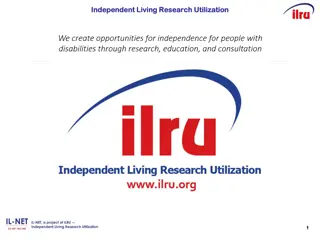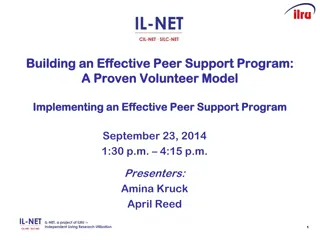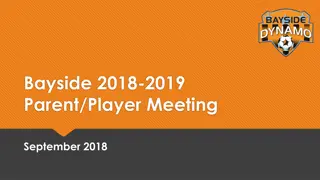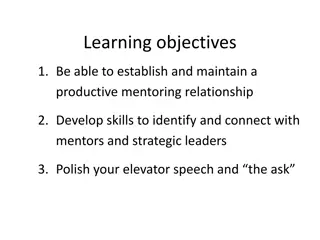
FAPE in Distance Learning: Guidelines and Resources
Explore federal and state guidance on Free Appropriate Public Education (FAPE) in distance learning, including developing learning plans, accessing YEA services, and helpful resources for parents. Learn about FAPE standards, IEPs, and the Endrew F. standard. Find support and information for special education services in Georgia.
Download Presentation

Please find below an Image/Link to download the presentation.
The content on the website is provided AS IS for your information and personal use only. It may not be sold, licensed, or shared on other websites without obtaining consent from the author. If you encounter any issues during the download, it is possible that the publisher has removed the file from their server.
You are allowed to download the files provided on this website for personal or commercial use, subject to the condition that they are used lawfully. All files are the property of their respective owners.
The content on the website is provided AS IS for your information and personal use only. It may not be sold, licensed, or shared on other websites without obtaining consent from the author.
E N D
Presentation Transcript
Division for Special Education Services and Supports Guidance for the 2020-2021 School Year Georgia Parent Mentor Partnership September 4, 2020 Jamila Pollard, Esq., Program Manager Senior/Legal Officer Richard Woods, Georgia s School Superintendent | Georgia Department of Education | Educating Georgia s Future
Learning Targets I can ohelp parents understand federal and state guidance regarding a FAPE in distance/remote learning. oexplain the purpose and process for developing a distance learning plan. oexplain when extended school year services and compensatory services are needed. olocate and share information on distance/remote learning and helpful resources. Richard Woods, Georgia s School Superintendent | Georgia Department of Education | Educating Georgia s Future
FAPE in Distance Learning Richard Woods, Georgia s School Superintendent | Georgia Department of Education | Educating Georgia s Future
IDEA Definition of FAPE 300.17 Free appropriate public education. Free appropriate public education or FAPE means special education and related services that (a) Are provided at public expense, under public supervision and direction, and without charge; (b) Meet the standards of the SEA, including the requirements of this part; (c) Include an appropriate preschool, elementary school, or secondary school education in the State involved; and (d) Are provided in conformity with an individualized education program (IEP) that meets the requirements of 300.320 through 300.324. 34 C.F.R. 300.320 Definition of IEP 34 C.F.R. 300.321 IEP Team 34 C.F.R. 300.322 Parent Participation 34 C.F.R. 300.323 When IEPs must be in effect 34 C.F.R. 300.324 Development, review, and revision of IEP Richard Woods, Georgia s School Superintendent | Georgia Department of Education | Educating Georgia s Future 4/4/2025 4
Endrew F. Standard for FAPE For all children, including those performing at grade level and those unable to perform at grade level, a school must offer an IEP that is reasonably calculated to enable a child to make progress appropriate in light of the child s circumstances. For all children, the educational program must be appropriately ambitious in light of their circumstances and every child should have the chance to meet challenging objectives. Richard Woods, Georgia s School Superintendent | Georgia Department of Education | Educating Georgia s Future 4/4/2025 5
Endrew F. Standard for FAPE LEAs should be able to provide a cogent and responsive explanation for their decisions that shows the IEP is reasonably calculated to enable the child to make progress appropriate in light of [the child s] circumstances. Richard Woods, Georgia s School Superintendent | Georgia Department of Education | Educating Georgia s Future 4/4/2025 6
If an [local educational agency (LEA)] continues to provide educational opportunities to the general student population during a school closure, the school must ensure that students with disabilities also have equal access to the same opportunities, including the provision of [free appropriate public education (FAPE)] [ ]. SEAs, LEAs, and schools must ensure that, to the greatest extent possible, each student with a disability can be provided the special education and related services identified in the student s IEP developed under IDEA. . . From OSERS Q/A on Providing Services to Children with Disabilities during the Coronavirus Disease 2019 Outbreak (March 2020) Richard Woods, Georgia s School Superintendent | Georgia Department of Education | Educating Georgia s Future
School districts must provide a [FAPE] consistent with the need to protect the health and safety of students with disabilities and those individuals providing education, specialized instruction, and related services to these students. . . School districts must remember that the provision of FAPE may include, as appropriate, special education and related services provided through distance instruction provided virtually, online, or telephonically. [D]uring this national emergency, schools may not be able to provide all services in the same manner they are typically provided. . . The determination of how FAPE is to be provided may need to be different in this time of unprecedented national emergency. . . From OCR/OSERS Supplemental Fact Sheet (March 21, 2020) Richard Woods, Georgia s School Superintendent | Georgia Department of Education | Educating Georgia s Future
GaDOE Guidance on Restart and Implementation for the IDEA Richard Woods, Georgia s School Superintendent | Georgia Department of Education | Educating Georgia s Future
Overarching Information GaDOE remains committed to the implementation of the IDEA, as well as the elevated priorities of partnerships between home and school and effective family engagement strategies. IDEA requirements have not been waived, and flexibility is needed as we seek way to implement regulatory requirements that were not created for a global pandemic. The importance of meaningful parent engagement becomes even more elevated as school teams and families must charter a path together that will be in the best interest of students. Richard Woods, Georgia s School Superintendent | Georgia Department of Education | Educating Georgia s Future
Alternative Instructional Delivery Models The three instructional delivery models are: Traditional (face-to-face) students access educational services, as much as possible, inside a brick and mortar building. Hybrid students access educational services using a combination of distance/remote learning and traditional (face-to-face). Full distance/remote student access educational services using distance learning strategies such as virtual instruction, digital platforms, instructional phone calls, and instructional packets. Richard Woods, Georgia s School Superintendent | Georgia Department of Education | Educating Georgia s Future
If a district is providing full distance/remote instruction for all students, can families of students with disabilities require educational services in the school building? No, the state constitution provides local school boards with the management and control of public schools; the district has flexibility to develop a restart plan based on safety guidance. However, a student s IEP Team makes the determination of what a student needs to receive a FAPE. Richard Woods, Georgia s School Superintendent | Georgia Department of Education | Educating Georgia s Future
If my district offers Alternative Instructional Delivery Models, what should families of students with disabilities consider? Families should consider the child s learning needs and necessary supports to access educational services, such as: Do we have access to stable internet connection? Do we have the technology to access digital learning and/or virtual instruction? Are there specific accommodations, assistive technology and/or modifications provided while receiving instruction in the traditional building that would be necessary at home? Are there additional special education services and supports that should be considered? Are instructional packets accessible for the learners? Richard Woods, Georgia s School Superintendent | Georgia Department of Education | Educating Georgia s Future
Can a district prioritize groups of students to return to the traditional school model? Yes, the district can prioritize groups of students or individual students based on unique circumstances to reintegrate back into the traditional school building prior to the return of other students. Richard Woods, Georgia s School Superintendent | Georgia Department of Education | Educating Georgia s Future
Sample plans to reintegrate students to traditional school building Sample Reintegration Plan Examples/Benefits Prioritize reintegrating groups and/or individual students based on unique circumstances Example Young children in grades K-2 Benefit Young children learn best through active engagement and meaningful opportunities to connect with others Example Students with IEPs, 504 Plans, or SST Plans Benefit May benefit from structured learning services in the building Reintegrate all students back into building by offering families the choice of an alternative instructional delivery model Example - Offer families one of the three delivery models Benefit Families can opt to access educational services in various ways Reintegrate students back into school building by offering families limited choice options for delivery models Example Offer families ONLY hybrid or full distance/remote Benefit IEP Teams can schedule related services on days when students are in the school building Richard Woods, Georgia s School Superintendent | Georgia Department of Education | Educating Georgia s Future
Procedural Changes that impact the normal school year Restart plans may include changes to the following: Instructional Calendar district adjusts the first and last day of school Instructional Days district changes the number of instructional days per week, such as 4 days instead of 5 days Instructional Minutes district changes the number of instructional minutes to stagger times to enter and exit the building (also could change amount of time students access virtual instruction using screen time) Instructional Time in Traditional School Building district utilizes hybrid model to limit large gatherings and crowds Please note: these procedural changes may impact special education services and supports. IEP Teams may need to review IEP to determine if changes or amendments are necessary. Richard Woods, Georgia s School Superintendent | Georgia Department of Education | Educating Georgia s Future
Test your knowledge Name at least 1 alternative instructional delivery model that Georgia school districts may use? Richard Woods, Georgia s School Superintendent | Georgia Department of Education | Educating Georgia s Future
Individualized Education Programs (IEPs) IDEA and Georgia Rules require that IEPs are in place at the beginning of the school year. Th beginning of the school year would be the initial start of the instructional calendar for all students. Students may already have current IEPs in place for the FY21 school year. In light of alternative instructional delivery models, it is necessary to consider whether IEPs can be implemented as written or if amendments and changes are necessary. Richard Woods, Georgia s School Superintendent | Georgia Department of Education | Educating Georgia s Future
Distance Learning Plans Contingency Planning during school closures Individualized Decisions Parent Participation Included with the IEP Developed using the IEP process Richard Woods, Georgia s School Superintendent | Georgia Department of Education | Educating Georgia s Future
Are families included during the development of distance learning plans? Yes, distance learning plans are not separate from the IEP and should be developed using the IEP process. Family engagement is critical to ensure that distance learning plans meet the needs of diverse learners. Richard Woods, Georgia s School Superintendent | Georgia Department of Education | Educating Georgia s Future
Are all students with disabilities required to have distance learning plans? No, IEP Teams will need to review special education and related services and ensure that IEPs can be implemented as written. If amendments or changes are needed, then the IEP Team may opt to document the changes in the IEP as an amendment or document the changes using a distance learning plan. Richard Woods, Georgia s School Superintendent | Georgia Department of Education | Educating Georgia s Future
IEP Amendment Process IEP changes or amendments may be made either by the entire IEP Team at an IEP Team meeting or by agreement between the parents and district. 34 C.F.R. 300.324; Georgia Rule 160-4-7-.06. An example of reaching agreement with parent to amend IEP without an IEP Team meeting is the special education case manager working with the parent to reach agreement regarding any amendments or changes. This process applies to traditional IEP amendments and distance learning plans. Richard Woods, Georgia s School Superintendent | Georgia Department of Education | Educating Georgia s Future
Does the IEP Team need to change or amend the IEP if there are no changes? No, if the special education and related services can be provided using alternative instructional delivery models, then the IEP does not need to be changed. It is always beneficial to document updates, i.e. whether services will be provided using distance/remote instruction. These notes can be included on a distance learning plan as well. Richard Woods, Georgia s School Superintendent | Georgia Department of Education | Educating Georgia s Future
What happens if the IEP Team determines that amendments or changes are necessary? The IEP Team will need to document the changes using an IEP amendment or a distance learning plan. If the amended IEP includes only special education and related services provided using distance/remote instruction, then the IEP Team will need to again amend the IEP upon resuming services in the traditional school building model. It is beneficial to add contingency plans and maintain the IEP services that would be provided in the building. Richard Woods, Georgia s School Superintendent | Georgia Department of Education | Educating Georgia s Future
What happens if there isnt agreement regarding the changes or amendments? The district will need to convene the entire IEP Team to make decisions regarding special education services. If the IEP Team does not reach agreement during the IEP Team meeting, then the district will need to determine how it is best to move forward. The district must provide prior written notice of the action to the parent and inform the parent of his/her rights. Parents may use the IDEA dispute resolution processes (e.g. mediation, formal complaint, due process hearing) Richard Woods, Georgia s School Superintendent | Georgia Department of Education | Educating Georgia s Future
IEP Amendment Process Distance learning plans provide clarity for educational services using an alternative instructional delivery model; however, the IEP is in effect upon resuming normal activities in the traditional school building. Richard Woods, Georgia s School Superintendent | Georgia Department of Education | Educating Georgia s Future
Test your knowledge The distance learning plan is developed outside of the IEP process and parents are not involved. TRUE OR FALSE Richard Woods, Georgia s School Superintendent | Georgia Department of Education | Educating Georgia s Future
Free Appropriate Public Education (FAPE) Will students with disabilities receive a FAPE during the pandemic? Yes. Those services may look different during this national emergency, and schools may not be able to provide all services in the same manner they are typically provided. FAPE may include services provided through distance instruction. If the special education services are different in the virtual setting, should the IEP Team automatically assume that FAPE is not being provided? No. Special education and related services may look different using different instructional models; however, the IEP can still be developed to support appropriate educational services. Richard Woods, Georgia s School Superintendent | Georgia Department of Education | Educating Georgia s Future
Free Appropriate Public Education (FAPE) As new families and district leaders learn more about FAPE, what are some general considerations? The IEP Team must consider the programming needs for an individual child to include: (a) type of service, (b) frequency of service, (c) intensity of service, (d) location of service, (e) access to service, and (f) least restrictive environment. Can the IEP Team determine that an individual student with a disability will require additional services to offer FAPE during a pandemic? Yes, the IEP Team may determine that different services are necessary. Richard Woods, Georgia s School Superintendent | Georgia Department of Education | Educating Georgia s Future
Free Appropriate Public Education (FAPE) If needed, can districts consider appropriate training for families to support the provision of special education services in the home setting? Yes, the IEP Team will need to consider the training and supports necessary for families to facilitate the learning process at home. Can IEP Teams discuss contingency plans during annual review meetings? Yes, it is helpful to consider services and supports that are necessary and appropriate in the event distance learning is needed. This is considered proactive planning. Richard Woods, Georgia s School Superintendent | Georgia Department of Education | Educating Georgia s Future
Questions from the group How are BIPs being done/handled when the student is Digital Learning? Richard Woods, Georgia s School Superintendent | Georgia Department of Education | Educating Georgia s Future
Least Restrictive Environment (LRE) If families opt to use distance/remote learning, will the IEP Team be required to change the placement in the IEP? No. Families of students with disabilities may opt to use an alternative instructional model; however, parent choice options do not replace the role of the IEP Team to make placement decisions for individual students with disabilities. Can students with disabilities receive remote instruction without changing the LRE? Yes. The special education services can be provided anywhere. The physical location of the special education service does not automatically change the LRE. Richard Woods, Georgia s School Superintendent | Georgia Department of Education | Educating Georgia s Future
Least Restrictive Environment (LRE) An IEP Team can change the placement of a student during this time. For example, a student may demonstrate medical necessity and meet the criteria for hospital/homebound (HHB) instruction, or a Team may determine that a student should receive home-based instruction in accordance with Georgia Rule 160-4-7-.07. However, there is no guarantee that HHB and homebased instruction will occur face-to-face in the home. Richard Woods, Georgia s School Superintendent | Georgia Department of Education | Educating Georgia s Future
Questions from the group In a newsletter I read today, it stated that while school districts are only offering virtual/remote learning, FAPE must be provided to the greatest extent possible. It then went on to say that if face to face learning is an option in a school district and the family voluntarily chooses to continue digital/remote learning, FAPE is not necessarily a requirement and should not be the ultimate expectation. Is the information provided accurate? Can you explain this concept further? Thank you. Richard Woods, Georgia s School Superintendent | Georgia Department of Education | Educating Georgia s Future
Extended School Year Services and Compensatory Services Richard Woods, Georgia s School Superintendent | Georgia Department of Education | Educating Georgia s Future
Extended School Year Services Are required if necessary, to provide FAPE to a student Are provided at no cost to the family Are provided beyond the normal school year Example IEP Team determines FAPE will require a student to receive educational services for 5 days a week as compared to the schedule to all students that is 4 days a week. Richard Woods, Georgia s School Superintendent | Georgia Department of Education | Educating Georgia s Future
Compensatory Services are Educational services that are awarded to students with disabilities to make up for services that they lost because of a Local Educational Agency s (LEA) failure to provide a Free and Appropriate Education (FAPE) under the Individuals with Disabilities Education Act (IDEA). Richard Woods, Georgia s School Superintendent | Georgia Department of Education | Educating Georgia s Future
When Must Compensatory Services be Provided? Compensatory services are awarded upon a denial of FAPE. However, not every denial of FAPE requires compensatory education. It is important to understand that compensatory services must not take away from or replace existing special education services. https://www.gadoe.org/Curriculum-Instruction-and- Assessment/Special-Education- Services/Documents/Virtual%20Learning%20Resource s/ESY%20and%20COMPENSATORY%20SERVICES %207.21.20.pdf (ESY vs. Compensatory Services) Richard Woods, Georgia s School Superintendent | Georgia Department of Education | Educating Georgia s Future
If a student does not receive services after an extended period of time, the student s IEP Team. . . must make an individualized determination whether and to what extent compensatory services are needed consistent with the respective applicable requirements, including to make up for any skills that may have been lost. From OCR Fact Sheet: Addressing the Risk of COVID-19 in Schools while Protecting the Civil Rights of Students (March 16, 2020) Richard Woods, Georgia s School Superintendent | Georgia Department of Education | Educating Georgia s Future
Where, due to the global pandemic and resulting closures of schools, there has been an inevitable delay in providing services or even making decisions about how to provide services IEP teams [ ] must make an individualized determination whether and to what extent compensatory services may be needed when schools resume normal operations. From OCR/OSERS Supplemental Fact Sheet (March 21, 2020) Richard Woods, Georgia s School Superintendent | Georgia Department of Education | Educating Georgia s Future
Compensatory Services Per OSEP s memo, during instances by which the student experienced a delay in services or no services at all due to school closures, IEP Teams will need to review the student s current level and consider eligibility for compensatory services. The delay or denial of services must be on the part of the district. If the district has made services available, then the district should document this attempt for planning purposes. Richard Woods, Georgia s School Superintendent | Georgia Department of Education | Educating Georgia s Future
Compensatory Services The IEP Team will meet and assess the individual needs, progress, and/or loss of skills for students who services were delayed or not provided and determine if the student is eligible for compensatory services. IEP Teams are not required to award compensatory services based on an hour-per- hour formula. Teams should consider the appropriate type, amount, frequency, and duration of services necessary to recoup the loss of skills and return child to place they would have been without the disruption of FAPE. Richard Woods, Georgia s School Superintendent | Georgia Department of Education | Educating Georgia s Future
When can families expect the review for compensatory services to take place? Districts should convene IEP Team meetings within a reasonable time, as possible after the beginning of the school year. It may be necessary to allow appropriate time for both students and teachers to acclimate into the new school year with relevant opportunities to assess current progress, attempt to recoup and recover loss of learning and determine the most appropriate services to make the child whole. Richard Woods, Georgia s School Superintendent | Georgia Department of Education | Educating Georgia s Future
Test your knowledge Who will make the determination whether a student requires compensatory services? A) Parent only B) District only C) IEP Team Richard Woods, Georgia s School Superintendent | Georgia Department of Education | Educating Georgia s Future
GaDOE Guidance on Restart and IDEA Timelines Richard Woods, Georgia s School Superintendent | Georgia Department of Education | Educating Georgia s Future
Formal Complaints Local educational agencies (LEAs) and parents may mutually agree to extend 60-day timeline for formal complaints to engage in mediation and due to the COVID-19 pandemic. State educational agencies (SEAs) may extend the 60-day timeline for formal complaints if exceptional circumstances exist with respect to a particular complaint (e.g., SEA cannot access specific information from LEA staff or a student s educational records needed to resolve the complaint due to COVID-19 pandemic) Richard Woods, Georgia s School Superintendent | Georgia Department of Education | Educating Georgia s Future
Due Process Hearings LEAs and parent may mutually agree to extend the timeline for the 30-day resolution period due to the COVID-19 pandemic. IDEA already permits LEAs and parents to agree to waive the resolution meeting and use mediation instead; hold resolution meeting through alternative means; and request hearing officer to grant a specific extension of time for a hearing. Richard Woods, Georgia s School Superintendent | Georgia Department of Education | Educating Georgia s Future
Individualized Education Programs (IEPs) LEAs and parents may mutually agree to extend timeline to develop initial IEP and conduct the annual review IEP Team meeting due to the COVID-19 pandemic. IDEA already permits LEAs and parents to mutually agree to use alternative means to hold IEP Team meetings and to agree not to convene an IEP Team meeting to make changes to a student s IEP after the annual IEP Team meeting. Richard Woods, Georgia s School Superintendent | Georgia Department of Education | Educating Georgia s Future
Initial Evaluations An initial evaluation must be conducted within 60 days of receiving parental consent or within the state-established timeline. LEAs and parents may mutually agree to extend the timeline to conduct the initial evaluation due to the COVID-19 pandemic. Richard Woods, Georgia s School Superintendent | Georgia Department of Education | Educating Georgia s Future
Initial Evaluations Holiday periods and other circumstances when children are not in attendance for five consecutive school days shall not be counted toward the 60 calendar day timeline, including the weekend days before and after such holiday period [or other circumstance], if contiguous to the holidays [or other circumstances] Ga. Bd. of Educ. R. 160- 4-7-.04(1)(b)(1). Other circumstances would be considered five or more consecutive days when children are not physically in attendance due to the COVID-19 pandemic AND statewide school closures. Richard Woods, Georgia s School Superintendent | Georgia Department of Education | Educating Georgia s Future

